Together In Development & Education (TIDE) Foundation is an educational reforms organization founded in November 2014 that aims at bringing about a sustainable change in the educational system. As of June 2019, we have impacted the lives of around 12,900+ individuals. We seek your support for a scalable, short-term intervention targeted at minimal learning levels.
The cost to impact a child for 4 months is just INR 1000.
This campaign aims to pilot an innovative intervention in Ahmedabad with the possibility to be scaled across all government schools in Gujarat, changing the future for them and their families. Read on to discover how.
HELP US RAISE INR 3L TO IMPACT 300 STUDENTS.

COST SHEET
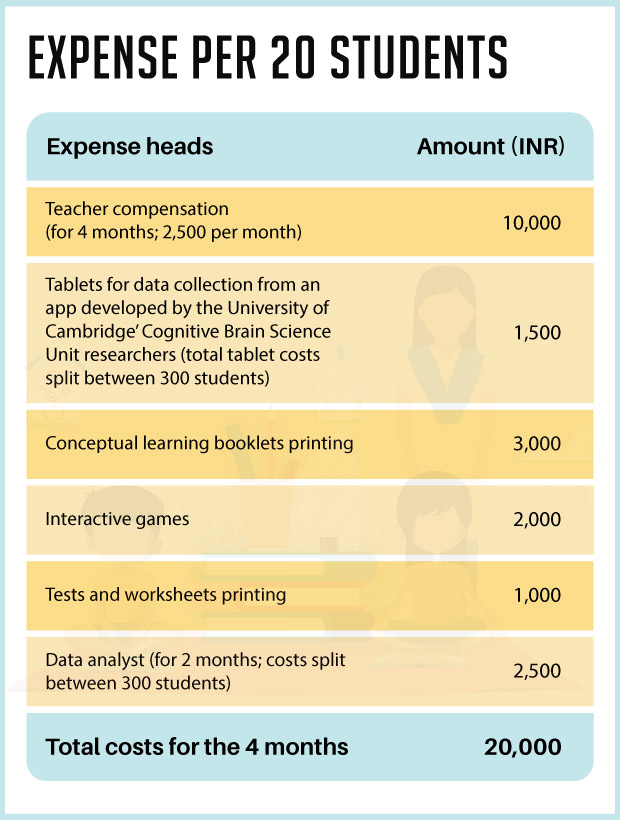
The Data Analyst is only required during the last two months of the program.
THE EDUCATION PROBLEM
In 2018 a study found that nearly 30% of class 6th to 8th students in Ahmedabad cant solve 2+2= 4 or write/comprehend simple sentences like "My name Is Rakesh". In our experience the problem In an urban slum Isn't this dire, however, nearly 60-75% of our students in grade 8th cannot do two-digit subtraction or division. Despite there being problems in foundational lIteracy and numeracy, schools go on with other concepts including subtraction of fractions, LCM, HCF, stories, and poems.
THE SCALABLE SOLUTION
The basic idea revolves around working with students in grades 3 -6 and school teachers conducting short spanned effective subject enrichment classes with a group of not more than 20 students (as opposed to their usual 60, for grant in aid schools, or 40, for government schools, in a classroom). The program aims to bring about self-directed learning and is fundamentally based on ideas of self-directed learning, peer learning, conceptual understanding, application-based learning, optimal difficulty levels and distributed practice (Uttle bit often). Many other remedial programs have seen a drop in learning In delayed post-testing due to the reliance on repeated practice; we hope to avoid this through conceptual understanding based booklets and practical application-based worksheets. We hope to develop students' foundational understanding in 3-4 months' time.
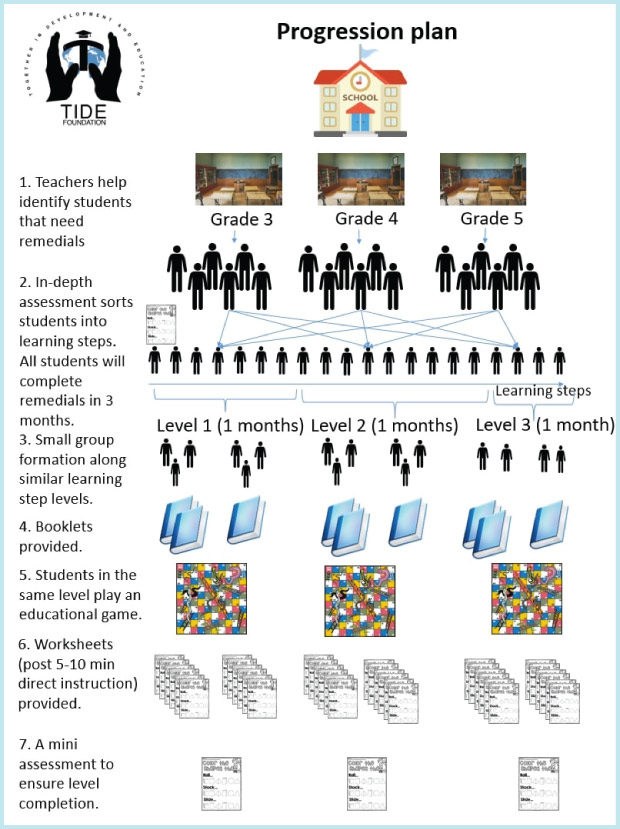
DEVELOPED RESOURCES
We have developed the following resources:
- An in-depth assessment tool that helps point out the conceptual learning problem that a child faces (for example there are 11 commonly made mistakes in division).
- Conceptual understanding based self and peer-directed learning booklets
- Interactive games for repetitive practice
- A set of application-based worksheets that consolidate and evaluate understanding.
ABOUT TIDE FOUNDATION
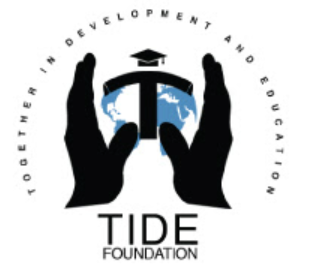
In a country like India, the provision of ensured quality education for a child is a big question. For a developing nation that is the second-most populous country in the world - It is a big challenge that for most children, primary education is at stake. TIDE as an organization works extensively towards the development of a unique and transient approach towards education and development simultaneously.
Access to quality education for all is the silver bullet to a lot of social challenges that India faces. We aim to develop contextualized, grass-root level sustainable changes that develop organically. The interventions hope to bring about systemic changes that thoroughly uplift a given community that we work with
COLLAGE
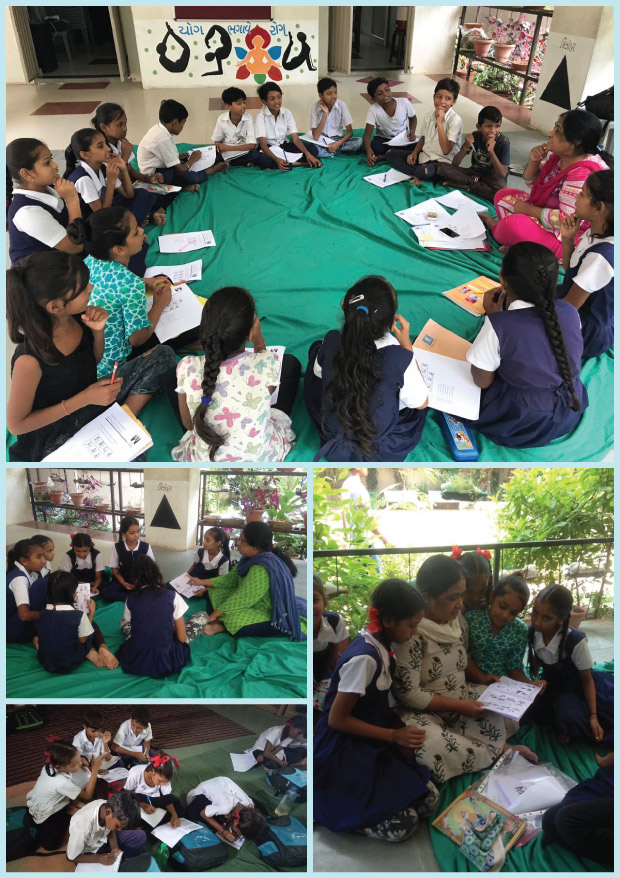
HELP US SUPPORT CHILDREN
We have recently completed our pre-pilot at 5 government schools and are seeking support to conduct an in-depth pilot program with 6-10 government schools and a total of 300 students. The pre-pilot aimed to test the feasibility of the program and contextualize the resources (Initial qualitative evaluation can be found on http://www.tideinternational.org/saral-kadam-program/). The pilot aims to be a quantitative impact evaluation that will inform further changes to the Intervention before the program can be scaled up. In the near future, we hope to scale the program to reach hundreds of schools in the city/state.
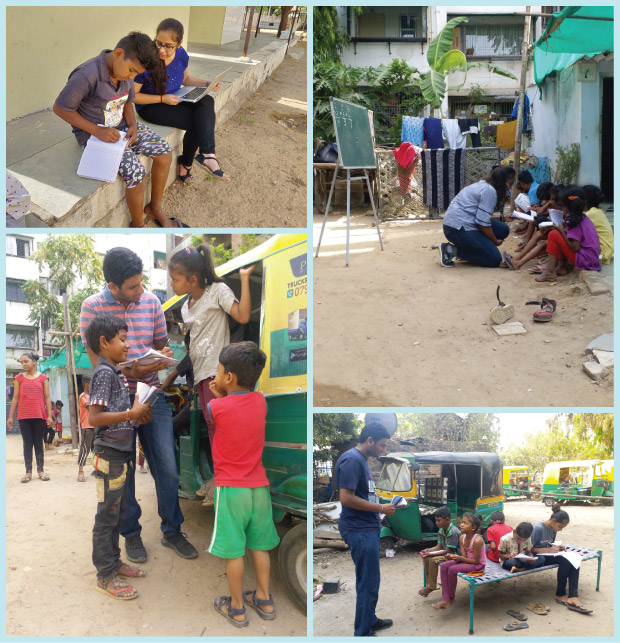
TAX BENEFITS
Funding for this campaign is eligible for tax breaks as TIDE is a registered NGO & you can avail of benefits under section 80G of IT act. Foreign funding is not accepted.
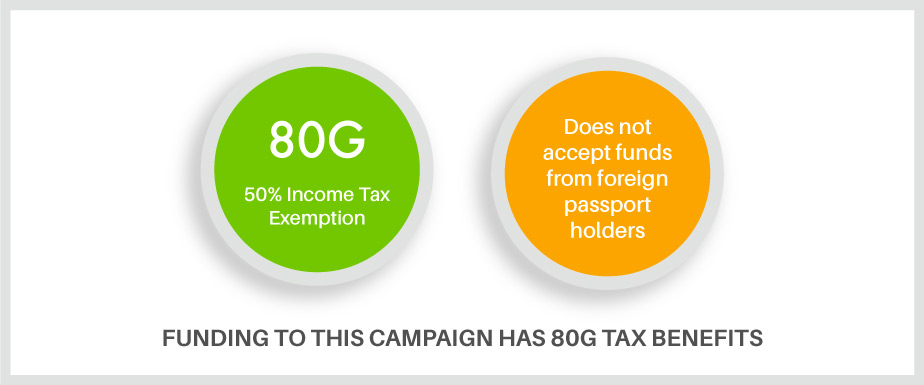
FEEDBACK
To ensure that there is complete transparency I shall get a report from NGO (this takes between 2 to 4 months usually after the funds are raised & transferred to them) telling me who benefitted from the funding. The details will then be posted on the UPDATES section of my campaign. As soon as I post an update, the platform will send an SMS and EMAIL alert to all the funders - i.e. to you. Click on the link on the email and you can read about who benefitted. That's transparent right.
The below image is an example of the FEEDBACK FORMAT that we will be shared with all my funders.
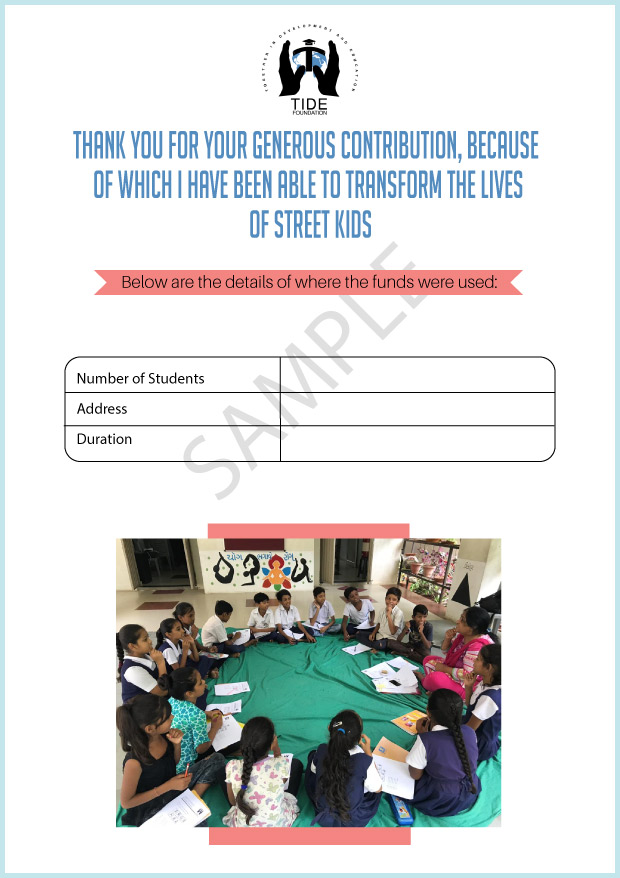
FAQs
When do I get the receipts?
The receipts will start getting processed about 4 to 6 weeks AFTER the campaign is closed and will be sent to you directly.
How does crowdfunding work?
Crowdfunding in India is a relatively new concept & is growing very quickly. It’s a concept that allows a large number of funders (like you) to fund an idea or a cause or event by giving small amounts of money online. Fueladream.com is a crowdfunding platform in India that allows for such pooling of funds. You can fund innovations & ideas on FuelADream and be the first to get these products or make them come true. You can also do a good turn by funding charities and causes. When you fund a charity it’s more like a donation & you get small innovative rewards like a shout-out on an FB page or a thank you email from the beneficiaries.
How are you measuring your impact?
We are following a strict research pedagogy to collect quantitative data on academic and non-academic outcomes. We have built networks for data analyses and have the support from a lecturer at University College London, two PhD students at the University of Cambridge, an MPhil graduate from the University of Cambridge, a lab at the University of Cambridge's Cognitive Brain Science Unit that developed an app for cognitive measures.
The Intervention schools have been randomly selected. We will be conducting pre-tests and post-tests, collecting cognitive data (on executive functions, problem-solving, general cognitive ability and basic math competencies) and behavioural reports from teachers of students. The program Impact will be compared against a control group, however, given the ethical Issues with randomly controlled trials, the control group of students Includes students from the same school that would have been adjudged at being in near similar levels of academic understanding but not needing remedials.
What happens after the pilot?
After the pilot, we hope to adapt and improve on the material before scaling up to
1. Directly reach at least 10,000 children
2. Partner with local NGOs (that we have been In conversation with for the past five years) to scale to the children they work with
3. Partner with low fee and higher fee private schools to provide resources for them as they cross fund resources for multiple government schools.
We also hope to explore a partnership with the government to scale the resources to all schools In the state and make all the resources open access (available to anyone via an online link).
How does 1 teacher teach 20 students at different levels?
It is hoped that most of the self-learning process is facilitated through booklets and activity cards and that the teacher helps with distributing appropriate materials, doubt solving and some direct teaching for short spans to help with the individual child's error.
